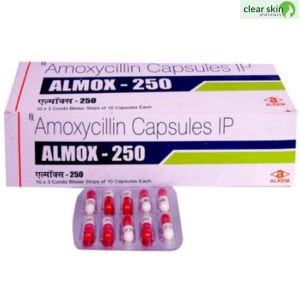About Doxcid
Doxcid is an antibiotic belonging to the tetracycline class used to treat bacterial infections. Doxcid is used to treat urinary tract infections, intestinal infections, lung infections, eye infections, sexually transmitted infections (such as gonorrhea, syphilis), gum infections and disorders (such as periodontitis), among others. Additionally, Doxcid cures acne-like lesions brought on by rosacea. However, it does not treat rosacea-related face redness.
As an antibiotic, Doxcid stops the growth of bacterial cells (the evil ones!) by blocking the production of the outer protein layer (cell wall) required for the growth and multiplication of bacteria. It is a broad-spectrum antibiotic, which means that it is effective against a range of bacteria. It is a bacteriostatic antibiotic, meaning that it inhibits the development of germs but does not always kill them.
Doxcid should only be taken if prescribed by a physician. It can be taken with or without food, however for optimal benefits, it should be consumed at a predetermined time. For optimal effects, Doxcid should be taken exactly as prescribed by your doctor. The most common adverse effects of Doxcid include nausea, vomiting, and diarrhea. Consult your physician if these side effects become bothersome.
Doxcid is a pregnancy category D (high risk) drug, hence its use during pregnancy and breastfeeding is not advised. Use of Doxcid during tooth development (the second half of pregnancy, infancy, and youth up to the age of eight) may result in tooth discoloration (yellow-grey-brown). Do not consume alcohol while taking Doxcid, as it may cause extreme drowsiness. Before using Doxcid, inform your doctor if you have a history of Doxcid allergy, renal illness, liver disease, esophagitis, or muscular disease (myasthenia gravis). Do not consume alcohol while taking Doxcid, since it may exacerbate undesirable side effects such as sleepiness and dizziness.
Utilizations of Doxcid: Bacterial infections: Acne
Medicinal Benefits
Doxcid is an antibiotic belonging to the tetracycline class that is effective against a wide variety of bacteria, including gram-negative, gram-positive, anaerobe, and some parasites. It is used to treat a variety of bacterial diseases of the respiratory tract (influenza, pneumonia), genitourinary system (syphilis, gonorrhea), anthrax infection, sinuses, eye, and skin. In addition, it is present in tick-borne diseases (typhus fever) caused by the Rickettsia bacterial group, such as typhus fever. Off-label uses include malaria prophylaxis or prevention in malaria-prone areas and acne therapy. When penicillin is contraindicated, your physician may occasionally give Doxcid as an alternate medication.
Directions for Use
Take Doxcid as prescribed by your physician. Ideally, take it on an empty stomach. It should be swallowed whole with plenty of water; it should not be chewed or crushed. If gastric irritation or stomach upset becomes bothersome, you may take it with meals and consult your physician about using an antacid. Do not ingest dairy items, such as milk, cheese, and yogurt, while taking Doxcid, as they inhibit its absorption in the stomach.
Storage
Place in a cool, dry location out of direct sunlight.
Side Effects of Doxcid
Every drug has undesirable side effects. Doxcid has several negative effects that may develop during the first few days of treatment, but improve over time. Common Doxcid side effects include nausea (feeling unwell), vomiting, and diarrhea. These side effects are transient and may subside with time. If these side effects persist or are bothersome, consult your physician.
Drug Warnings
Iron and antacids (such as magnesium hydroxide and aluminum hydroxide) can bind to Doxycycline in the digestive tract, reducing its effectiveness. Therefore, at least two hours should pass between taking Doxycycline and iron supplements or antacids. Long-term usage of Doxycycline during tooth development (the second half of pregnancy, infancy, and youth up to the age of eight) may result in permanent tooth discolouration (yellow-grey-brown). In some circumstances, the usage of Doxycycline is also related with antibiotic-associated diarrhea. Doxycycline may make the skin more sensitive to sunlight and UV radiation, resulting in a more severe sunburn reaction. Therefore, it is recommended to apply sunscreen before going outdoors. Its use has also been linked to an increased risk of fungal skin infections, such as athlete’s foot (vaginal candidiasis – thrush). Tetracycline and Doxycycline can generate a stable calcium complex in bone-forming tissue, consequently altering the growth of young children’s fibula bones and the development of the fetus’ bones. It has been observed that the combination of Doxycycline and isotretinoin causes pseudotumor cerebri (increased pressure inside the brain). Long-term usage of Doxycycline may impact the health of your blood, kidneys, and liver; therefore, annual diagnostic testing for these parameters is advised. Doxycycline does not totally prevent malaria caused by P. falciparum because it is only used as a preventive regimen (protection) whenever a person enters a malaria-prone region.
Drug Interactions
Drug-Drug Interaction: Doxycycline is contraindicated in patients with a history of hypersensitivity to tetracycline or penicillin, retinoid medications taken orally (such as acitretin, isotretinoin), blood thinners (such as warfarin), heart disease medication (digoxin), anti-seizure medications (such as phenytoin, carbamazepine), antacids (especially those containing aluminum
Calcium and iron-containing foods should be avoided within two hours of taking Doxycycline, as these may diminish its efficacy. Avoid consuming alcohol, as it may induce drowsiness and impair Doxycycline absorption.
Drug-Disease Interaction: Doxycycline should not be administered to patients with kidney disease, liver illness, esophagitis, lupus (an autoimmune disease), or muscular disease (myasthenia gravis).
Safety Advice
ALCOHOL
If alcohol is being consumed, Doxycycline should not be used unless prescribed by a physician. Inform your doctor if you drink alcohol.
PREGNANCY
Doxycycline is classified as Pregnancy Category D. No appropriate and well-controlled research has been conducted on the use of doxycycline in pregnant women. In some instances, using Doxycycline during pregnancy may have an impact on the dental and bone development of the fetus. Therefore, if you are pregnant or planning to become pregnant, consult your doctor before to using Doxycycline.
BREAST FEEDING
Doxycycline is eliminated in breast milk, although the extent of Doxycycline absorption by a breastfed infant is unknown. Therefore, the nursing mother should consult a physician before to using Doxycycline.
DRIVING
The effect of doxycycline on the ability to drive or operate heavy machinery has not been thoroughly investigated, however there is no evidence that doxycycline may impair driving abilities. If you are experiencing unusual sleepiness or drowsiness after taking Doxycycline, consult your physician.
LIVER
Take Doxycycline with caution, particularly if you have a history of liver problems or disorders. Your doctor may need to modify your dosage.
KIDNEY
Doxycycline is safe for use in individuals with renal disease at the prescribed dose, and no dose change is necessary. If prescribed by a physician, Doxycycline can be used safely. However, it is best to consult your physician if you have a known kidney disease or condition.
Habit Forming : No
Diet & Lifestyle Advise
Probiotics should be taken after completing a full course of Doxycycline to restore any beneficial intestinal bacteria that may have been eliminated. After taking antibiotics, using probiotics can lessen the incidence of antibiotic-associated diarrhea. Certain fermented foods, such as yogurt, cheese, sauerkraut, kombucha, and kimchi, can aid in the restoration of beneficial intestinal flora.
Include more fiber-rich foods in your diet because they are easily digested by your gut bacteria, so promoting their growth. Thus, fiber-rich diets may aid in the restoration of healthy gut bacteria following an antibiotic regimen. Include whole grains such as whole grain bread and brown rice in your diet.
Calcium and iron-rich foods and beverages may interfere with the effectiveness of Doxycycline.
Consuming alcoholic beverages while taking Doxycycline can cause dehydration and disrupt sleep. This can make it more difficult for Doxycycline to help your body fight infections.
Special Advise
Doxycycline should be taken on an empty stomach or one to two hours before meals, however it can cause stomach distress. To avoid this, Doxycycline may be taken with food, but you must drink lots of water to stay hydrated.
To prevent throat irritation, Doxycycline should be taken standing up. Do not lie down for 30 minutes after taking the medication.
Even if you feel better after taking Doxycycline, you should continue to take it until your doctor tells you otherwise. This may cause the symptoms to recur and antibiotic resistance will make the infection difficult to cure.
Pregnant women and children younger than 8 years old should not use doxycycline since it can damage tooth development.
Doxycycline should not be taken after its expiration date, as it degrades into kidney-damaging compounds at that point.
Ensure that you consume ample fluids when you are ill. This can help you clear up the infection more quickly, protect you from dehydration, and alleviate some of the unpleasant side effects of Doxycycline.
Sunglasses and sunscreen should be worn when going outside, as Doxycycline might make the skin photosensitive.
Other Information : This item is Not Returnable.
Disease/Condition Glossary
In a bacterial infection, pathogenic bacteria invade, proliferate, and infect the body. It can target any part of the body and multiply rapidly. When you have a bacterial infection, you may feel widespread symptoms such as fever, chills, and exhaustion. The common shapes of bacteria are spherical, rod-shaped, and spiral-shaped. From mild ailments like sore throats and ear infections to severe brain infections like meningitis and encephalitis, bacterial infections range in severity. Streptococcus, Staphylococcus, and E. coli are a few pathogenic bacteria that cause infections. Anyone is susceptible to contracting a bacterial infection. However, a weakened immune system or immunosuppressive medication can increase your susceptibility to bacterial infection.
Rosacea is a skin illness that produces persistent facial redness. Small blood vessels on the cheeks and nose frequently get irritated and red. Many individuals with rosacea also get acne-like blemishes on their faces.
Antibiotic-induced diarrhea or Antibiotic-associated diarrhea refers to the incidence of diarrhea (more than three loose, watery stools per day) following the administration of antibiotics. This is due to the fact that antibiotics also destroy healthy intestinal bacteria (gut flora), which benefits in digestion and fighting infections.
FAQs
Doxycycline typically has no effect on contraception, including oral contraceptives and emergency contraceptive tablets. However, if you suffer diarrhea or vomiting, your birth control pill may no longer prevent pregnancy. Please visit your physician if you have any questions regarding Doxycycline use.
Completing the complete course of Doxycycline is essential, since otherwise the infection may reappear in a more severe form and become difficult to treat owing to antibiotic resistance, even though you are feeling better.
Do not take antacids containing aluminum, calcium, or magnesium, or other medications containing these cations, zinc, iron salts, or bismuth preparations orally within two hours of taking Doxcid, as these may interfere with the absorption of Doxcid from the stomach. Avoid consuming dairy items within two hours of taking Doxcid, as they decrease the drug’s absorption.
Alcohol may diminish the effectiveness of Doxcid. It is therefore recommended to avoid consuming alcohol when taking Doxcid.
Doxcid use during tooth development (the second half of pregnancy, infancy, and youth up to the age of eight) may result in persistent discoloration of teeth (yellow-grey-brown). Therefore, it is not suggested for pregnant women, nursing mothers, or children younger than 8 years old.
Doxcid use may increase your skin’s sensitivity to sunlight and UV light. Therefore, it is best to apply sunscreen creams to your skin before leaving the house.
Doxcid may promote the overgrowth of fungal skin infections, such as candida. This occurs due to the fact that Doxcid also destroys helpful bacteria that protect against thrush. If such symptoms arise, consult your physician.








Be the first to review “DOXCID 100MG 10 tablets”